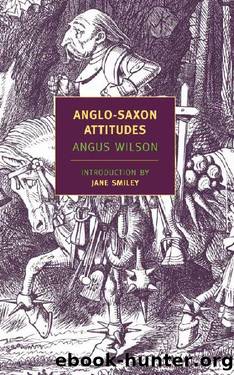Anglo-Saxon Attitudes (New York Review Books Classics) by Angus Wilson

Author:Angus Wilson [Wilson, Angus]
Language: eng
Format: epub
ISBN: 9781590177846
Publisher: New York Review Books
Published: 2013-11-26T05:00:00+00:00
âNo, no, Middleton,â said Professor Clun, âI donât care for any wine.â
Gerald asked, âAre you sure?â before dismissing the wine waiter.
âYes, yes,â said Clun irritably, âI am not prone to make parades of polite refusals. If, that is, such nonsense can be counted a politeness.â
The luncheon was not going well. Arthur Clun had decided to be âat a lossâ â he was âat a lossâ to understand Geraldâs acceptance of the editorship; did he feel so satisfied that his work on the Confessor was advanced enough to assume this further responsibility? âI doubt,â he said, âif the exacting work of an editorship of this kind will prove compatible with the active pursuit of your hobby. I imagine that that sort of connoisseurship tends to become a full-time pursuit, if, that is, a man has the means to indulge such interests.â He was at a greater loss to understand the inclusion of so many inexperienced, younger scholars in a great work of this sort. He was the last to wish to stand in the way of new ideas or fresh talent; indeed, as far as the Bulletin went, he often felt that Sir Edgar was not open enough to, well, he would not say progress, because such abstractions were inapplicable to the study of history, but to change. He had been seriously vexed once or twice when Sir Edgar had incalculably refused remarkable contributions by brilliant Ph.D. pupils of his own. But the History was quite a different matter.
âAs I see it,â he said, and he cut his roll into four equal pieces and placed on each of them an equal share of butter, âthe Medieval History will remain the principal repository for secondary statements for a decade or two. It will certainly be used extensively at home and abroad for university standard teaching. I can imagine only one, or, at a pinch, two qualifications by which the contributors should be judged. For myself, the primary, I would almost say the sole, requisite is depth of scholarship tried over years of organized research work. I cannot feel happy that men in their late twenties, assistant lecturers like Roberts, or even recently appointed lecturers like String-well-Anderson, have the length of experience necessary, the historical background required for such important work. I shall be told that they are brilliant â it may be so, I have never been a very happy judge of brilliance in vacuo â but, of this I am certain, brilliance that has not been tempered by the discipline of long years of apprenticeship to research will not give the History what it requires. We shall get flashy stuff, Middleton, brilliant, unsustained flashes in the pan, unsupported guesses. Such contributors will be straining to prove themselves â I donât blame them, they are not yet established as scholars, they have their future to make; I would have run the same risks at that age if it had not been for a climate of established opinion, now alas vanished, which discouraged such displays of pyrotechnics.
Download
This site does not store any files on its server. We only index and link to content provided by other sites. Please contact the content providers to delete copyright contents if any and email us, we'll remove relevant links or contents immediately.
| Ancient & Classical | Arthurian Romance |
| Beat Generation | Feminist |
| Gothic & Romantic | LGBT |
| Medieval | Modern |
| Modernism | Postmodernism |
| Renaissance | Shakespeare |
| Surrealism | Victorian |
4 3 2 1: A Novel by Paul Auster(12357)
The handmaid's tale by Margaret Atwood(7732)
Giovanni's Room by James Baldwin(7305)
Asking the Right Questions: A Guide to Critical Thinking by M. Neil Browne & Stuart M. Keeley(5743)
Big Magic: Creative Living Beyond Fear by Elizabeth Gilbert(5729)
Ego Is the Enemy by Ryan Holiday(5395)
The Body: A Guide for Occupants by Bill Bryson(5066)
On Writing A Memoir of the Craft by Stephen King(4921)
Ken Follett - World without end by Ken Follett(4708)
Adulting by Kelly Williams Brown(4555)
Bluets by Maggie Nelson(4535)
Eat That Frog! by Brian Tracy(4502)
Guilty Pleasures by Laurell K Hamilton(4428)
The Poetry of Pablo Neruda by Pablo Neruda(4082)
Alive: The Story of the Andes Survivors by Piers Paul Read(4011)
White Noise - A Novel by Don DeLillo(3993)
Fingerprints of the Gods by Graham Hancock(3980)
The Book of Joy by Dalai Lama(3962)
The Bookshop by Penelope Fitzgerald(3829)
